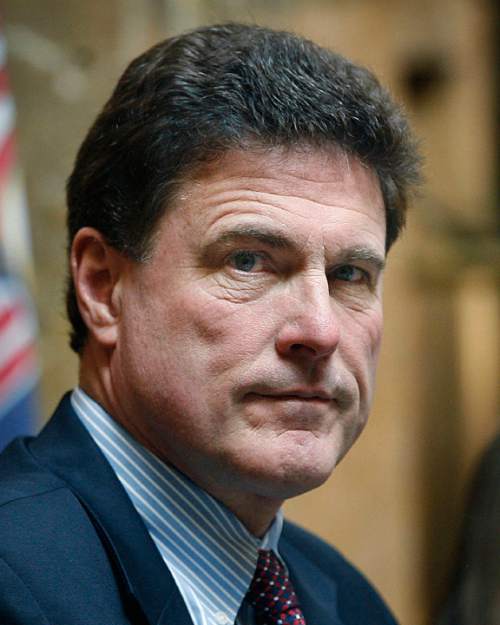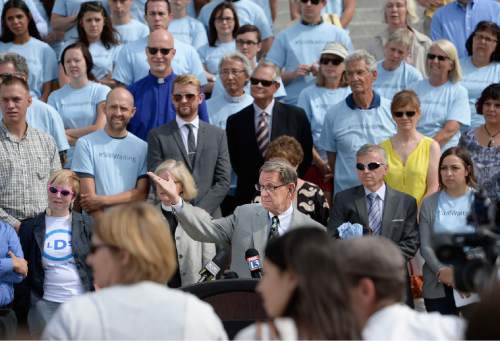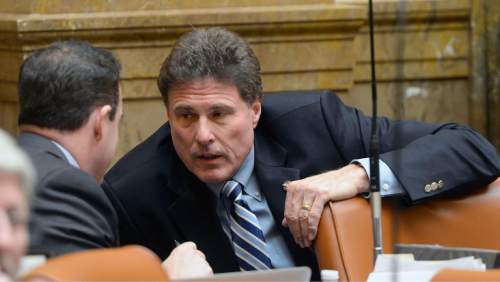This is an archived article that was published on sltrib.com in 2015, and information in the article may be outdated. It is provided only for personal research purposes and may not be reprinted.
Legislative leaders are working on an agreement to expand Medicaid coverage to tens of thousands of uninsured, low-income Utahns, but even if a deal is struck, it will be far too late for Carol Frisby.
Frisby died Monday from cancer, years after she first showed symptoms but couldn't get the colonoscopy her doctor recommended because the screening wasn't covered by the state's Primary Care Network.
"I'm not going to back down, and she's never been one to back down," said Carol's husband, Brent Frisby, a Vietnam War veteran. "My message to them is: Get off this childish stuff, and let's be pioneers and do something to help people."
While Brent Frisby made preparations Wednesday to bury his wife of 23½ years, the so-called Gang of Six (a group made up of Gov. Gary Herbert and Lt. Gov. Spencer Cox, along with Republican legislative leaders and lawmakers) huddled to try to work through differences over whether — and if so, how — to expand Medicaid under the Affordable Care Act, or Obamacare, to cover up to 126,500 people.
House Majority Leader Jim Dunnigan, R-Taylorsville, said Utah lawmakers are being cautious and trying to learn from other states that expanded Medicaid and then found enrollment and costs were higher than projected.
"We know there are people who need health care, and we're trying to devise a plan so we don't give it to them and then take it away," Dunnigan said. "That takes work and effort, and we don't want to find ourselves in the position of Kentucky or Illinois, where their plans are costing two or three times as much as they expected and then we have to make adjustments we don't want to have to make."
Dunnigan said the group is working on broad concepts and examining numbers from other states and conceded it will not meet a self-imposed July 31 deadline. But he hopes state leaders can reach a deal before the next legislative session in January 2016.
Right now, there is no agreement on even the broadest portions of the plan — whether to cover only those below the poverty level or those making up to 138 percent of that marker, which would bring in more federal tax money to offset the costs. The higher level would provide insurance to a family of four making nearly $33,000 a year.
Rep. Ray Ward, R-Bountiful, a physician, said he would like to have seen the state move ahead with a plan years ago, when it was first able to take advantage of the ACA, and wants to see action soon.
"[This] matters to real individual people. [In] real life, bad, horrible things happen when people don't get the care they should get," Ward said. "The budget numbers are all important. We have to make the budget match up, but the budget is not the reason to do it. The reason to do it is people like Carol."
Carol Frisby visited her doctor years ago after experiencing abdominal pain and rectal bleeding.
The physician recommended a colonoscopy and put in an order for the procedure, Ward said. But the only health coverage Frisby had was through the state's Primary Care Network, which covers only basic things, such as doctor visits, so she never got the screening.
It wasn't until her condition had grown much worse that the Frisbys went to the emergency room in November 2013. Doctors diagnosed her with metastatic cancer, which had spread from her colon to her liver and lungs.
"Then she got Medicaid, of course, because now she has cancer," Ward said. " So, for the last year, she's been in the hospital several times and got all the appropriate treatment, and it was just too late."
In the 20 months that followed, bills for Carol's treatment ran close to $400,000, Brent Frisby said.
"If they'd treated it [early], it would've been $1,200. They could've got the diagnosis and got the tumors out, and she'd still be alive," he said. "They could have probably saved my wife and other people for pennies on the dollar rather than millions on the dollar when they had to take these people and bring them on Medicaid and Medicare."
The Frisbys visited the Legislature in March, during the session, urging lawmakers to pass Herbert's Healthy Utah alternative plan to expand Medicaid. The proposal cleared the Senate but fell well short in the House.
On Saturday, Brent Frisby called Ward to tell him his wife was in hospice care, and the legislator visited her. She had wasted away to 84 pounds. On Sunday, she went to church and later that evening was tired and lethargic, her husband recalls. By 6 a.m. the next day, she was gone.
RyLee Curtis, Medicaid policy analyst for the Utah Health Policy Project, said Frisby is the second Utahn who advocated for Medicaid expansion to have died waiting for lawmakers to act.
Emily Young, who appeared at the governor's health summit in 2012 and later before the Legislature, died in early 2014 from breast cancer.
"They've made a promise to the people of Utah," Curtis said. "We've waited three years … and we're starting to see the results of inaction."
Curtis said she is happy leaders are still talking about a compromise Medicaid expansion — "at the same time, people are losing their lives when we could have done something for them."
Dunnigan said he recognizes the need for coverage and notes that, even after a deal is struck, it will take time to get the program running.
"That's why we are urgently trying to find a solution," he said. "This is not something you just snap your fingers and implement, and we need to find a solution so we can proceed to the implementation phase."
Meanwhile, elsewhere at the Capitol on Wednesday, a coalition of low-income advocates, religious and progressive political types launched a campaign urging lawmakers to extend health care to low-income Utahns.
The campaign is called #StillWaiting, a pointed reference to the fact that Utah policymakers have failed for three years to agree on Medicaid expansion.
"This decision was deferred in the 2013, 2014 and 2015 legislative sessions, and now the House leadership is delaying again, suggesting there will be no headway until the 2016 legislative session," a news release from the leading organizer, Alliance for a Better Utah, said.
"Given the repeated studies and reports showing the strong economic [benefit] of expanding health coverage, our legislators are failing to lead and protect our state's physical and financial future. We need action now."
Carol Frisby will be buried Thursday afternoon in a small service with her family. Her story will be the focus of a documentary about the uninsured. And Brent Frisby said he plans to keep the pressure on the Legislature.
"We're not going to roll over," he said. "Her story just needs to be told. She was a pioneer in trying to do something."







